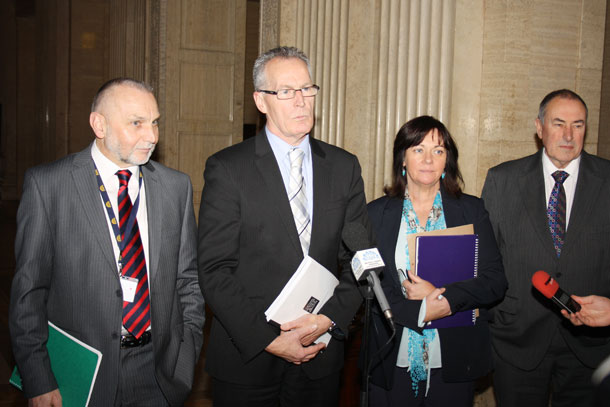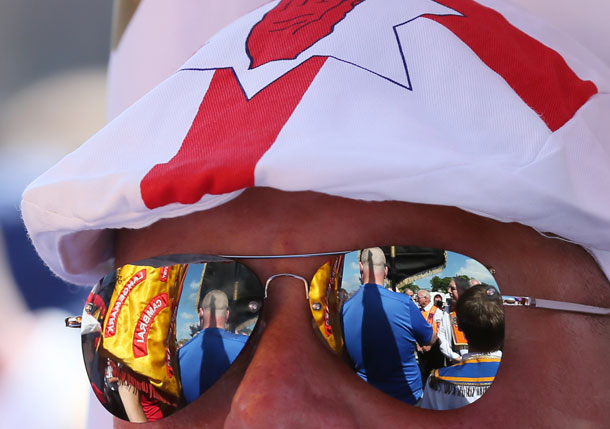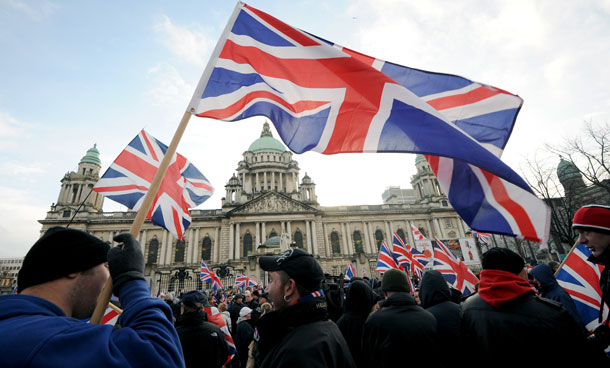1 December 2013 Edition
Haass Talks: Sinn Féin’s proposals on the past, parades and flags

• Sinn Féin’s Seán Murray, Gerry Kelly, Jennifer McCann and Mitchel McLaughlin at the talks
“We believe that all parties, political parties, combatant organisations, government and their agencies, should pledge to tell and hear the truth about the past. The role of the media in shaping beliefs many interpreted as truths should be examined.”
IN A BID to stimulate debate and progress on addressing legacy issues, contentious parades and flags, Sinn Féin published three discussion papers for everyone to consider ahead of meeting US diplomat Dr Richard Haass when the former US special envoy arrived back in Belfast on 18 November with his deputy, Dr Meghan O’Sullivan.
In its paper titled Addressing Legacy Issues: Building a Common Future Sinn Féin says it believes that if we locate legacy issues in the framework of conflict resolution and in the context of the broader Peace Process “then we can address these matters in a way which will heal divisions, consolidate the peace and become guarantors of the future”.
That said, the paper acknowledges that “we live in a divided and largely segregated society”, one where “there are many differing perspectives on the causes of the past conflict, what happened and who was responsible”.
It argues that, in examining legacy issues:
“The role and actions of all combatant organisations must be fully considered, including government, state agencies and the legal and judicial system.
“And paramount in all of this must be the views of the victims and survivors. Their voices must be heard and respected, not simply the loudest voices, not simply those on any particular side or those on no side. The views of the many thousand victims and survivors who have remained silent must also be heard.
“Regrettably, the past cannot be changed, nor the suffering, hurt and violence which was part of it undone. And none of it can be disowned by any party of the conflict.
“We believe that all parties, political parties, combatant organisations, government and their agencies, should pledge to tell and hear the truth about the past. The role of the media in shaping beliefs many interpreted as truths should be examined.”
Sinn Féin believes that an effective truth recovery mechanism underpinned in legislation should be established.
Referencing Sinn Féin’s discussion documents Truth and Truth Recovery (submitted to the British and Irish governments in September 2009), the party reiterates its belief that an independent International Truth Commission – independent of the state, combatant groups, political parties, civil society and economic interests — is required to deal with legacy issues and the past in an unbiased way.
“Accordingly, the two governments should authorise a reputable body such as the United Nations to devise and implement all measures and processes necessary to achieve effective truth recovery methods” and the public reporting of its findings and recommendations.

Parades
Contentious parades have featured in every political negotiation since 1998. While the Orange Order lifted its ban on its lodges engaging with nationalist resident groups in March 2012, it is believed there have only been two instances of direct engagement between the Orange Order and residents (in Crumlin and Ardoyne).
Talks have brought resolutions to previously contentious parades in Derry, Maghera and Crumlin, Sinn Féin notes but says that where “meaningful dialogue” is not forthcoming from parade and/or protest organisers, then it is incumbent upon the Parades Commission, to consider the balance in rights involved.
The Sinn Féin document details proposals on the regulation of parades under headings for a code of conduct, independent monitoring, post-parade review hearings, bands’ conduct, the introduction of the model accepted by the loyal orders in Scotland for parades, and “non-parade related protests”.

Flags and emblems
On flags, symbols and emblems, Sinn Féin says it is “committed to proactively work with the republican/nationalist community to develop agreed protocols around flags, symbols and emblems with our unionist/loyalist neighbours”, adding:
“What is required is a manifestation of mutual respect for both identities, British and Irish.”
To solve the problem of the proliferation of flags, Sinn Féin suggests “an agreement to establish a single flag-post in each area on which respective national flags will be flown and maintained over time”.
It also proposes:
- No flags or emblems to be displayed on key arterial routes (to be defined) and town centres;
- No paramilitary flags, displaying symbols or names, and regimental military flags (e.g. Parachute Regiment) on display in public places;
- No flags/emblems to be displayed in the vicinity of places of worship, schools, hospitals or any publicly-funded buildings, or within or adjacent to shared/mixed/new housing developments, interface boundaries;
- Flags/emblems/symbols that are tattered, torn, discoloured or in general disrepair confer a lack of respect and should be removed;
- Protocols could be developed in local areas or between neighbouring districts on flags, including a ‘no flags’ policy pertaining to both identities and no pavements to be painted in ‘traditional’ colours (i.e. red, white and blue or green, white and orange.



